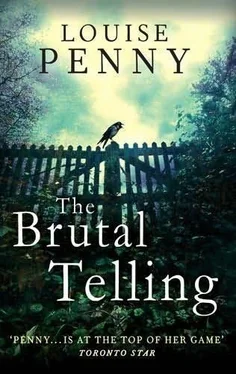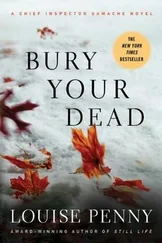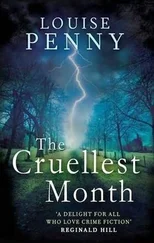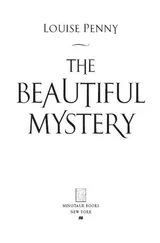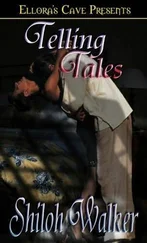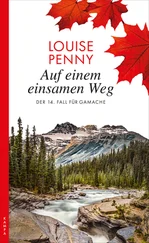“My favorite quote from Thoreau is also from Walden ,” said Gamache. “ A man is rich in proportion to the number of things he can afford to let alone .”
“In your job you can’t let many things alone, can you?”
“No, but I can let them go, once they’re done.”
“Then why are you here?”
Gamache sat quietly for a moment then spoke. “Because some things are harder to let go than others.”
Vincent Gilbert nodded but said nothing. While the Chief Inspector stared into space the doctor pulled out a small Thermos from a knapsack and poured them each a cup of coffee.
“How are Marc and Dominique?” Gamache asked, sipping the strong black coffee.
“Very well. The first guests have arrived. They seem to be enjoying it. And Dominique’s in her element.”
“How’s Marc the horse?” He was almost afraid to ask. And the slow shaking of Vincent’s head confirmed his fears. “Some horse,” murmured Gamache.
“Marc had no choice but to get rid of him.”
Gamache saw again the wild, half-blind, half-mad, wounded creature. And he knew the choice had been made years ago.
“Dominique and Marc are settling in, and have you to thank for that,” Gilbert continued. “If you hadn’t solved the case they’d have been ruined. I take it from the trial that was Olivier’s intention in moving the body. He wanted to close the inn and spa.”
Gamache didn’t say anything.
“But it was more than that, of course,” said Gilbert, not letting it go. “He was greedy, I suppose.”
And still Gamache said nothing, not wanting to further condemn a man he still considered a friend. Let the lawyers and judges and jury say those things.
“The Hungry Ghost,” said Gilbert.
That roused Gamache, who twisted in his garden chair to look at the dignified man next to him.
“ Pardon? ”
“It’s a Buddhist belief. One of the states of man from the Wheel of Life. The more you eat the hungrier you get. It’s considered the very worst of the lives. Trying to fill a hole that only gets deeper. Fill it with food or money or power. With the admiration of others. Whatever.”
“The Hungry Ghost,” said Gamache. “How horrible.”
“You have no idea,” said Gilbert.
“You do?”
After a moment Gilbert nodded. He no longer looked quite so magnificent. But considerably more human. “I had to give it all up to get what I really wanted.”
“And what was that?”
Gilbert considered for a long time. “Company.”
“You came to a cabin in the woods to find company?” smiled Gamache.
“To learn to be good company for myself.”
They sat quietly until Gilbert finally spoke. “So Olivier killed the Hermit for the treasure?”
Gamache nodded. “He was afraid it’d be found. He knew it was only a matter of time, once your son moved here and Parra started opening the trails.”
“Speaking of the Parras, did you consider them?”
Gamache looked at the steaming mug of coffee warming his large hands. He’d never tell this man the full story. It wouldn’t do to admit that Havoc Parra in particular had been their main suspect. Havoc worked late. He could have followed Olivier to the cabin after closing the bistro. And while Havoc’s whittling tools had tested negative maybe he used others. And wasn’t the Hermit Czech?
Or if not Havoc then his father Roar, who cut the trails and was almost certainly heading straight for the cabin. Maybe he found it.
Maybe, maybe, maybe.
A wide trail of “maybe’s” led directly to the Parras.
But Gamache also chose not to tell Gilbert that he had also been a suspect, as had his son and daughter-in-law. The cabin was on their land. Why had they bought the ruined old house when they could have had any place? Why had they ordered the trails reopened so quickly? It was almost the first thing they did.
And why had the saintly Dr. Gilbert and the body both appeared at the same time?
Why, why, why.
A wide trail of “why’s” led directly to the front door of the old Hadley house.
They all made good suspects. But all the actual evidence pointed to Olivier. The fingerprints, the murder weapon, the canvas sack, the carvings. They’d found no whittling tools in Olivier’s possession, but that meant nothing. He would have gotten rid of them years ago. But they had found nylon line in the B and B. The same weight and strength used for the web. Olivier’s defense argued it was the standard ply and proved nothing. Gabri testified that he’d used it for gardening, to tie up honeysuckle.
It proved nothing.
“But why put that word up in the web, and carve it in wood?” asked Vincent.
“To frighten the Hermit into giving him the treasure in the sack.”
It had been a shockingly simple solution. The trail was getting closer every day. Olivier knew time was running out. He had to convince the Hermit to hand it over, before the cabin was found. Because once that happened the Hermit would realize the truth: Olivier had been lying. There was no Mountain. No army of Dread and Despair. No Chaos. Just a greedy little antique dealer, who could never get enough.
No approaching horror, just another Hungry Ghost.
Olivier’s last hope of getting the burlap bag from the Hermit was to convince him the danger was imminent. To save his life Jakob had to get rid of the treasure. So that when the Mountain arrived he’d find the Hermit, but no sack.
But when the story failed to terrify enough, when the trail had come too close, Olivier had brought out his napalm, his mustard gas, his buzz bomb. His Enola Gay .
He’d put the web up in the corner. And placed the whittled word somewhere in the cabin, for Jakob to find. Knowing that when the Hermit saw it he would—what? Die? Perhaps. But he would certainly panic. Knowing he’d been found. The thing he’d hidden from, the thing he’d fled from. The thing he most feared. Had found him. And left its calling card.
What had gone wrong? Had the Hermit not seen the web? Had the Hermit’s greed exceeded even Olivier’s? Whatever happened one thing Gamache knew for certain. Olivier, his patience at an end, his nerves frazzled, his rage in full flood, had reached out, clasped the menorah. And struck.
His lawyer had opted for a jury trial. A good strategy, thought Gamache. A jury could be convinced it was temporary insanity. Gamache himself had argued that Olivier should be tried for manslaughter, not murder, and the prosecution had agreed. The Chief Inspector knew Olivier had done many terrible things to the Hermit, on purpose. But killing him wasn’t one. Imprisoning Jakob, yes. Manipulating and taking advantage of him, yes. Unbalancing an already fragile mind, yes. But not murder. That, Gamache believed, had surprised and appalled even Olivier.
Such an appropriate word. Manslaughter.
That’s what Olivier had done. He’d slaughtered a man. Not with that one terrible blow, but over time. Wearing him down, so that the Hermit’s face was scored with worry lines and his soul cringed with every scrape of a twig.
But it turned into a murder/suicide. Olivier had killed himself in the process. Whittling away what was kind and good about himself, until loathing replaced self-respect. The man he could have been was dead. Consumed by the Hungry Ghost.
What finally damned Olivier wasn’t speculation but facts. Evidence. Only Olivier could be placed at the cabin. His prints were found here, and on the murder weapon. He knew the Hermit. He sold some of his treasures. He sold the carvings. He stole the burlap bag. And finally, the murder weapon was found hidden in the bistro, along with the bag. His lawyer would try to come up with all sorts of arguments, but this case would hold. Gamache had no doubt.
Читать дальше
